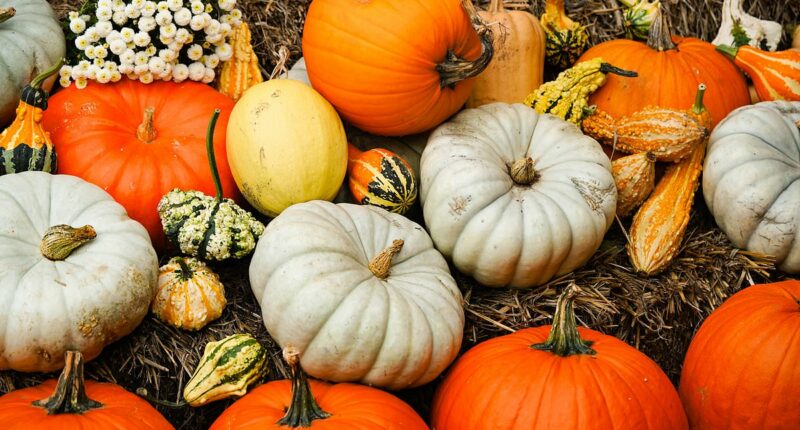Share this @internewscast.com
Every October, pumpkins become the stars of the season, gracing our front porches as intricately carved jack-o’-lanterns, flavoring our beloved spiced lattes, and stacking up in supermarket displays. Yet, as soon as the Halloween festivities fade, we often let these vibrant gourds slip from our minds.
It’s a pity because pumpkins—and their seeds—offer a wealth of nutritional benefits that should earn them a year-round spot in your culinary repertoire, rather than being relegated to a mere Halloween decoration.
The Golden Glow of Good Health
Beyond their cheerful orange facade, pumpkins are a treasure trove of nutrients. They are packed with carotenoids, the natural plant compounds responsible for their striking color. Among these, beta-carotene stands out as the most prevalent. Once consumed, beta-carotene transforms into vitamin A in the body, playing a crucial role in enhancing vision, maintaining healthy skin, and bolstering the immune system.
Behind their bright orange flesh lies a wealth of nutrients.
Pumpkins are rich in carotenoids—the plant pigments that give them their vivid hue. Beta-carotene, the most abundant of these, is converted in the body to vitamin A, which supports vision, skin health, and immune function.
Studies show that diets high in carotenoid-rich foods are linked with lower inflammation and a reduced risk of chronic diseases, from heart disease to certain cancers.
Pumpkins are also a good source of vitamin C, which boosts immune defence and collagen production for healthy skin. Plus, their high potassium content supports heart health and helps counterbalance excess sodium in modern diets.

Pumpkins belong on the menu, not just carved and on your doorstep

Jack O’Lanterns are a common sight at Halloween
But there’s more to pumpkins than their colour.
A single serving of cooked pumpkin (approx 100g) provides over 2g of fibre, which helps stabilise blood sugar, supports gut health, and keeps you feeling fuller for longer.
Their natural sweetness makes them a clever way to add flavour and creaminess to soups, curries, and even smoothies, without relying on refined sugars or dairy.
Are all pumpkins edible?
While the giant field pumpkins used for carving can be turned into soups or pies, they’re not the tastiest—their flesh is watery and fibrous.
The best pumpkins for eating are smaller, denser varieties that pack more flavour and nutrients per mouthful.
- Crown Prince: With its blue-grey skin and deep orange flesh, this variety is rich, nutty, and high in carotenoids.
- Kabocha (Japanese Pumpkin): Dense, sweet and packed with beta-carotene, Kabocha has one of the highest nutrient profiles of all pumpkins.
- Butternut Squash: Technically a squash, but close enough to count. Its smooth, sweet flesh makes it perfect for roasting or soups.
- Hokkaido (Red Kuri or Chestnut Squash): Slightly chestnut-flavoured and edible skin, making prep easy. It roasts beautifully and holds its shape in salads.
- Harlequin Squash: Compact, colourful and easy to find in UK supermarkets; its creamy, nutty flesh roasts beautifully and holds its shape in stews and salads.
All of these varieties can be roasted, steamed, or blitzed into dips and purees—and all contribute a good mix of vitamins A, C, and E, potassium, and fibre.
Pumpkin seeds: tiny but mighty

A Crown Prince pumpkin is high in vitamin A boosting beta-carotene

Helen Johnston, certified nutritional therapist and founder of Sucseed shares her tips and tricks to boost your health this Halloween
If the flesh is the body of the pumpkin, the seeds are its heartbeat.
Pumpkin seeds are among nature’s most concentrated sources of minerals, particularly zinc, magnesium, and selenium—all key players in immunity, gut health, and hormone balance.
Zinc, for example, is vital for the production and activity of white blood cells, which are the body’s first line of defence against infection.
Low zinc levels can make you more prone to catching colds or struggling to recover from illness.
Selenium, meanwhile, helps regulate inflammation and supports the thyroid, which influences metabolism and immune response.
Magnesium—often low in modern diets—contributes to muscle relaxation, sleep quality, and bowel regularity.
Many people find that including magnesium-rich foods such as pumpkin seeds, (or chia seeds, leafy greens and cocoa powder) can help reduce anxiety, ease restless legs, and even improve the depth of their sleep.
More trials are needed prove a causal link but the association in clinical observation is strong.
Gut health and beyond

Pumpkin seeds are a nutritional powerhouse
Pumpkin seeds are also rich in fibre and plant protein, both of which feed the beneficial bacteria in your gut microbiome.
A healthy microbiome supports digestion, balances mood, and enhances the immune system.
Early research even suggests pumpkin seed oil may help reduce intestinal inflammation and support bowel function.
You can eat pumpkin seeds raw, roasted, or ground—each has its place.
Roasting brings out their flavour, but if you’re after maximum nutrition, cold-milled or soaked (‘activated’) seeds are easiest to digest and allow better absorption of minerals.
However, the golden rule is: any seeds are better than none. Sprinkle them on porridge, salads, or yogurt; stir into soups; or blend into smoothies for an easy nutrient lift.
The sleep connection
It might surprise you to know that pumpkin seeds could help you sleep better. They contain tryptophan, an amino acid the body converts into serotonin and then melatonin—two hormones that regulate mood and sleep cycles.
Combined with their magnesium content, this makes a handful of pumpkin seeds before bed a surprisingly effective natural sleep aid.
How to add more pumpkin to your diet

A nourishing bowl of pumpkin soup is great all through autumn and winter
One of the joys of pumpkin is its versatility. It can go sweet or savoury with ease:
- Roast cubes of pumpkin with olive oil, cumin, and garlic for a hearty side dish.
- Blend cooked pumpkin into smoothies for a creamy texture and a boost of carotenoids.
- Whisk pumpkin puree into pancake or muffin batter.
- Toss pumpkin seeds over salads, soups, or overnight oats for crunch and extra minerals.
- Try pumpkin hummus – blend roast pumpkin with chickpeas, lemon juice, and tahini.
As a nutritionist, I always encourage clients to think beyond supplements, to find health in real, whole foods.
Seeds are one of the easiest ways to do this, but most people simply forget to include them.
That’s why I created SUCSEED—a range of seed and botanical herb blends designed to make it effortless to add nutrient-dense seeds such as pumpkin, flax and sunflower to your daily routine.
Just sprinkle them on breakfast, blend into smoothies, or stir into soups and salads for a powerful dose of natural goodness.
So, next time you’re carving a pumpkin, don’t throw away the good stuff.
Roast the flesh, save the seeds, and celebrate a vegetable that truly deserves to shine long after the Halloween lanterns have gone out.












